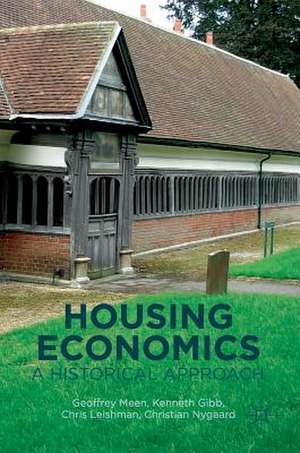Housing Economics: A Historical Approach
Autor Geoffrey Meen, Kenneth Gibb, Chris Leishman, Christian Nygaarden Limba Engleză Hardback – 12 mai 2016
Preț: 730.35 lei
Preț vechi: 890.66 lei
-18% Nou
Puncte Express: 1096
Preț estimativ în valută:
139.75€ • 146.21$ • 116.09£
139.75€ • 146.21$ • 116.09£
Carte tipărită la comandă
Livrare economică 02-16 aprilie
Preluare comenzi: 021 569.72.76
Specificații
ISBN-13: 9781137472700
ISBN-10: 1137472707
Pagini: 272
Ilustrații: XIV, 313 p. 32 illus., 23 illus. in color.
Dimensiuni: 148 x 210 x 23 mm
Greutate: 0.52 kg
Ediția:1st ed. 2016
Editura: Palgrave Macmillan UK
Colecția Palgrave Macmillan
Locul publicării:London, United Kingdom
ISBN-10: 1137472707
Pagini: 272
Ilustrații: XIV, 313 p. 32 illus., 23 illus. in color.
Dimensiuni: 148 x 210 x 23 mm
Greutate: 0.52 kg
Ediția:1st ed. 2016
Editura: Palgrave Macmillan UK
Colecția Palgrave Macmillan
Locul publicării:London, United Kingdom
Cuprins
Preface.- 1. Introduction: Why a Historical Approach?.- 2. A Tale of Three Victorian Cities: Exploring Local Case Studies.- 3. Key Concepts from the Literature.- 4. Geology and Cities.- 5. Wars, Epidemics and Early Housing Policy: The Long-run Effects of Temporary Disturbances.- 6. Speculation, Sub-division, Banking Fraud and Enlightened Self-interest: The Making of the Contemporary Glasgow Housing System.- 7. Building Our Way Out of Trouble.- 8. Residential Density Revisited: Sorting and Household Mobility.- 9. Path Dependence, the Spatial Distribution of Immigrant Communities and the Demand for Housing.- 10. Affordability and the Rise and Fall of Home Ownership.- 11. On the Persistence of Poverty and Segregation.- 12. Final Reflections.-
Recenzii
“This scholarly and informative study presents a long-term economic perspective on a range of housing and urban policy issues. … the ways in which the authors have set their thought-provoking research into a wider housing policy context make this a valuable study both for academics and policy-makers.” (Robert Smith, International Journal of Housing Policy, Vol. 17 (2), March, 2017)
Notă biografică
Geoffrey Meen is Professor of Applied Economics at the University of Reading, UK, and Adjunct Professor at RMIT University, Australia.
Kenneth Gibb is Professor in Housing Economics and Director of Policy Scotland at the University of Glasgow, UK.
Chris Leishman is Professor of Housing Economics at Heriot-Watt University, Edinburgh, UK.
Christian Nygaard is Associate Professor in Social Economics at the University of Reading, UK.
Textul de pe ultima copertă
The world has still to emerge fully from the housing-triggered Global Financial Crisis, but housing crises are not new. The history of housing shows long-run social progress, littered with major disasters; nevertheless the progress is often forgotten, whilst the difficulties hit the headlines. Housing Economics provides a long-term economic perspective on macro and urban housing issues, from the Victorian era onwards. A historical perspective sheds light on modern problems and the constraints on what can be achieved; it concentrates on the key policy issues of housing supply, affordability, tenure, the distribution of migrant communities, mortgage markets and household mobility. Local case studies are interwoven with city-wide aggregate analysis. Three sets of issues are addressed: the underlying reasons for the initial establishment of residential neighbourhoods, the processes that generate growth, decline and patterns of integration/segregation, and the impact of historical development on current problems and the implications for policy.
